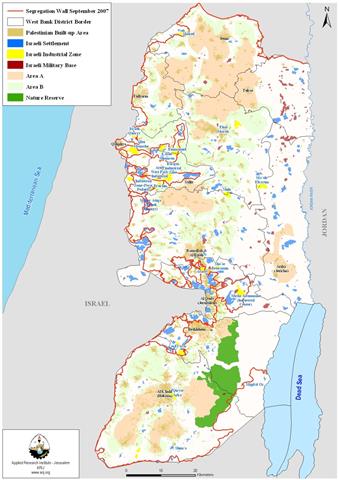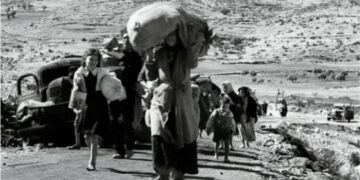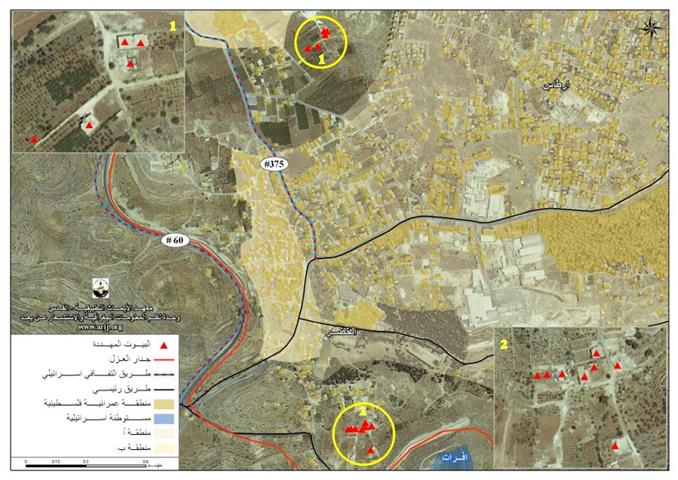Since 1967, the successive Israeli governments invested significant resources in establishing and expanding the Illegal Israeli settlements in the Occupied Territories, both in terms of the area of land they occupy by expropriating as mush as possible of the Palestinian lands, and in terms of population. As a result of this policy, approximately 600,000 Illegal Israeli settlers now living in 199 settlements, and 232 outposts distributed in the West Bank, including those established in East Jerusalem, all built in contradiction to the international law.
The study, also articulates that among the 199 Israeli settlements there are 20 settlements known as Industrial settlements. The table below illustrates the industrial settlements constructed throughout the West Bank during the period between 1970 and 1999. See Table 1
|
Table 1: the Israeli Industrial settlements in the West Bank |
|||||
|
No. |
Industrial Zone |
Date of Establishment |
Area- Dunums |
Population |
Location in Palestinian Governorate |
|
1 |
Sha'ar Benyamin |
1999 |
574 |
NA |
Jerusalem |
|
2 |
Atarot |
1970 |
1378 |
NA |
Jerusalem |
|
3 |
Near Peduel |
1991 |
246 |
NA |
Salfit |
|
4 |
Shaked |
1981 |
858 |
527 |
Jenin |
|
5 |
Ma'ale Ephraim |
1970 |
1370 |
1423 |
Jericho |
|
6 |
Mishr Adumim |
1974 |
3378 |
NA |
Jerusalem |
|
7 |
Elon Moreh |
1979 |
1396 |
1212 |
Nablus |
|
8 |
Barqan |
1981 |
1417 |
NA |
Salfit |
|
9 |
Israeli Quarry |
NA |
219 |
NA |
Qalqiliya |
|
10 |
Shilo |
1978 |
1364 |
1945 |
Nablus |
|
11 |
Migdal Oz |
1977 |
1133 |
334 |
Hebron |
|
12 |
Kiryat Arba' |
1972 |
1193 |
6819 |
Hebron |
|
13 |
Alfei Menashe |
1981 |
2905 |
5541 |
Qalqiliya |
|
14 |
Karne Shomron |
1978 |
1022 |
6280 |
Qalqiliya |
|
15 |
Mazor Atiqa |
1986 |
707 |
NA |
Salfit |
|
16 |
Bruchin |
1999 |
328 |
NA |
Salfit |
|
17 |
Ariel |
NA |
1729 |
NA |
Salfit |
|
18 |
Eli'ezar |
1975 |
536 |
1300 |
Bethlehem |
|
19 |
Emmanuel |
1981 |
1063 |
2700 |
Qalqiliya |
|
20 |
Shim'a |
1985 |
562 |
349 |
Hebron |
|
* |
TOTAL |
***** |
23378 |
28430 |
***** |
The industrial settlements produces today hundreds of products ranging from food and beverage products (43+ products) to household products (47+) and many more; all of which are sold worldwide with no indication of its origin other that being labeled 'product of Israel', See Map 1

Map 1: Israeli Industrial Zones in the Occupied West Bank
On the ground, these industrial settlements became an effective tool in the Israeli persistent effort to legalize and normalize the existence of all the illegal Israeli activities established in the occupied territory. Their purpose went to serve far beyond the economic factor, as the industrial settlements served as luring instrument for the non-religious Israeli citizens to occupy and live in the settlements; more than that but to attract the international market as well. On the other hand, the industrial zones had detrimental effects on the Palestinian occupied land for none of the Israeli health code standards, environmental standards, or labor laws were carried out seriously and effectively as they did in Israel. Moreover, the settlements and industrial zones deprived Palestinian villages and communities from the lands allocated for the future expansion of these communities. furthermore, they constitute a real threat and negative effects to the Palestinian environment since these Industrial zones get rid of all industrial wastewater, drainage, and solid waste on the nearby Palestinian agriculture lands causing a real danger to the environment and public health in the West Bank. See Table 2 which explains some of the damages that the Industrial zones caused to the Palestinian environment:
|
Table 2: Places into which wastewater is discharged in the West Bank |
||||
|
Israeli Settlement |
Palestinian Governorate |
Places of Wastewater Discharged |
||
|
Rosh Zurim |
Bethlehem
|
The wastewater flows from the settlement into the agricultural lands of the Palestinian village of Al Jaba’a in Bethlehem Governorate causing damage to the lands.
|
||
|
Barkan |
Salfit
|
The discharge of wastewater is very hazardous as it contains an industrial drainage, solid wastes, and paints.
|
||
|
Kiryat Arba’
|
Hebron
|
The industrial wastewater flows out from the Israeli settlement into the farming lands between Hebron and Bani Na’im areas.
|
||
|
Table of the places of solid waste disposal coming out from the Israeli Settlements |
||||
|
Israeli Settlements |
Palestinian Governorate |
Harms |
||
|
Ariel |
Salfit |
The solid wastes of these outposts are disposed of in the agricultural lands of Salfit Governorate. These wastes are accumulated and sometimes burned causing air pollution. In addition, the liquids inside these solid wastes are absorbed by soil causing contamination in the groundwater.
|
||
|
Settlement’s Outposts near the Green Line |
Near the Green Line (Armistice Line of 1949) |
The solid wastes are disposed of by burning, which causes harms to plants and to the surrounding agricultural lands in the area, in addition to the air pollution and the danger of soil absorption of such liquids that also would contaminate the groundwater.
|
||
|
Table of the Israeli factories that cause a serious harm to the Palestinian Environment |
||||
|
Israeli Settlement |
Palestinian Governorate |
Factory |
Environmental Damage |
|
|
Atarot |
Ramallah
|
Aluminum ,food and plastic factories |
Discharging alkaline materials that cause desertification. |
|
|
Kfar Etzion |
Hebron
|
Avocado factory |
Giving off an unpleased smell as well as producing harmful wastes.
|
|
|
Al Khan al Ahmar (Ma’ale Adumim) |
Jerusalem
|
Plastic equipment, rubber and leather factories |
Causing air and noise pollution, in addition to the use of toxic substances in the production process. |
|
It should be noted that Israeli occupation authorities seek to attract and to encourage Jewish and foreign investors to invest inside West Bank settlements through providing commercial and industrial incentives including reduction in individual and corporate taxes. That is in addition to providing advanced industrial infrastructure as well as exporting privileges to European countries.
In addition to expansion works, Israeli industrial companies have the tendency to move their factories inside the West Bank as to take advantage of the relatively cheap but skilful Palestinian workforce. Moreover, these companies are taking advantage of the fact that such labor falls under the jurisdiction of the Jordanian, rather than the Israeli, labor laws. As such, Palestinian labor inside the West Bank get paid using a much lower payment scale with less labor rights. In turn, Palestinian workers residing under the pressure of unemployment and poverty find themselves forced to accept working in these Israeli factories under unfair conditions.
Barkan and Ariel Gardens Settlements and their Effects on the Environment:
The Barkan industrial settlement was built atop lands belonging to the Palestinian villages of Haris, Broqin and Sarta in the governorate of Salfit. It started as a nucleus for an industrial settlement in 1981 and its expansion have started ever since. Currently it has 2720 Dunums under its jurisdiction. Its build up area is 349 Dunums with a population of 1300 colonists. Factories presently exist in the settlements include oil, plastic and lead factories which negatively affects the Palestinian environment.
As for the Ariel Gardens, it is the industrial park associated with the settlement of Ariel which was established in 1999 west of the settlement and east of the Palestinian village of Broqin. Tens of Dunums from the villages of Haris and Broqin were confiscated for the purpose of establishing the “Gardens” in which tens of factories are currently present.
It is to be noted that the Barkan Industrial Zone has played a major role in polluting the Palestinian environment and in spreading diseases throughout the region via pumping raw sewage from its factories into nearby Palestinian lands. In addition, the Ariel “Gardens” produces sewage that is pumped into the village of Broqin in a stream that sometimes comes as close as 6 meters to some Palestinian houses in the village.
The hazardous environmental effects of the two industrial zones have been discussed a number of times in the Palestinian Ministry of Health and some international arenas. However, nothing has changed in reality. To the contrary, pollution has dramatically increased and is only expected to intensify with the expected increase in the number of factories in the industrial zones.
The outpouring of sewage into the lands of the villages of Broqin and Kafr Al Deek destroys the beautiful landscape in the area and is psychologically depressing due to the awful smell produced by large quantities of sewage. In addition, the animals and plants growing in the area are under the threat of becoming poisoned due to the proliferation of pollutants which might cause a harmful effect on human health on the short and long runs. Not to mention the effect of the sewage on underground water which has led to the pollution of springs used by Palestinians as sources for drinking waters. Samples taken from the springs, cistern and school and house waters in the village of Broqin were tested by the Palestinian Ministry of Health in 2007 and found to be highly polluted.
In addition to what is stated above, the stagnant water in the valleys of the villages offers the best environment for breeding mosquitoes and other insects including Lishminia-carrying mosquitoes which are currently wide spread in the villages of Broqin and Kafr Al Deek. Since the beginning of 2008, at least 15 cases of Lishminia were reported in the villages of Kafr Al Deek, Broqin and Sarta.
Moreover, the Palestinian Ministry of Health has reported a noticeable increase in the cases of Hepatitis (a), cancer and diarrhea in the area which threatens with the outbreak of other epidemics leading to a real humanitarian crisis in the area.
Why the Boycott
Experience has proved that people can make a different. It might take sometime but eventually many will come around. The responsibilities of all those who believe in democracy and rights of all the people to live in freedom and not under oppression is great to push for boycott against Israel, on various levels, which include among many forms: trade, travel and diplomatic boycott, which can be carried out in an ascending process starting on the local level, where it really counts; and then on a national level, to spread to the wider international community. This was demonstrated in the experiences of the anti-apartheid movement against South Africa apartheid regime and is very much applicable to Israel in support of the oppressed Palestinian people prolonged struggle for freedom.
Again; Why the Boycott,
‘Until the Israeli government shows it is serious about complying with international law and joining the international community of law-abiding nations, the EU must apply economic pressure for it to do so.’ – Dr Caroline Lucas, Green Party
That says it all; it is about time that Israel be made to conform to the international law, UN resolutions, and to end its occupation. It is no secret that almost every war fought in the region Israel is involved overtly or covertly and that too is not of the boycott issue. Israel defiance of the international community or indifference to it on one hand, and the international community failure to put an end to the Israeli occupation on the other hand has without a doubt contributed by some means to the endurance of the Israeli occupation, which meant:
-
More Palestinian homes destroyed
-
Lives and livelihoods lost
-
Illegal construction of settlements and outpost
-
Building the Segregation Wall
-
Creating an apartheid regime of roads
-
Countless violation to human rights
-
Thousand of prisoners including minors imprisoned
-
Hundreds of checkpoints to restrict Palestinians' movement.
And much more,
‘I've been very deeply distressed in my visit to the Holy Land; it reminded me so much of what happened to us black people in South Africa. I have seen the humiliation of the Palestinians at checkpoints and roadblocks, suffering like us when young white police officers prevented us from moving about.’ – Archbishop Desmond Tutu
Governments of the world have failed to pressure Israel to end its violations of international law and human rights or to hold Israel accountable, and despite the International Court of Justice ruling of 2004 regarding the Segregation Wall no tangible steps have been taken on the ground to end it. This is exactly where the boycott comes in because it is up to the people and civil society organization to act, to let the people know to what they are contributing when buying settlements' products and to push their governments to do the same.
Still, there is hope,
Recently, international companies are starting to take tangible steps on this regard, boycotting the Israeli occupation moving their industries out of the Occupied Palestinian Territories; of such:
-
Barkan Wineries, which produce and market wines and liqueurs from owned vineyards in the occupied Golan Heights. The company relinquished their main facilities and winery in the industrial zone of the Barkan settlement in the West Bank by December 2007. Barkan Wineries is partially owned by The Tempo Beverages, which is partially owned by Heineken.
-
Assa Abloy the owner group of Mul-T-Lock, the Swedish door factory company acted on appeals from the Church of Sweden and decided to move out from the Barkan industrial settlement in the occupied West Bank.
On countries level, some countries that it is time to reassess their policy looking the other way while Israel has long –for decades- exploited the EU leniency toward exporting the industrial settlements' products and enjoying same tariff exemption privileges as Israeli produced products. On this regard, the British government has started a crack down action on Israeli settlements exports, derived from the fact that Israel violated its trade agreements with the EU by exploiting tariff exemptions only to goods produced in Israel but not including goods produced in industrial settlements in the occupied territories, which according to United Nations resolutions and international law, consider Israeli settlements, including the industrial settlements illegal, and even render a war crime, according to the Fourth Geneva Convention.
This was realized through joined and cooperative work and pressure exercised by British and Palestinian human rights groups – boycott campaign against Israel.
however, Israel has made it difficult for the British government and any other government to proceed with the boycott action since the companies operating in the industrial settlements have their headquarter based inside Israel, while the factory, packaging, etc is carried out at the industrial settlements, thus labeling all produced products according to the location of that company's headquarter and not to where the actual products is manufactured and produced.
This brings us to need to raise the bar to the level of boycott to exceed in the calls to boycott the settlements products' to boycott all Israeli products at least until Israel abide by the trade agreements to label all products produced in industrial settlements accordingly and not to just use 'product of Israel' to mislead the origin of such product.
Finally,
It is without doubt that the role played by the European civil society to fight apartheid in South Africa had significant impact to where their governments stood at the time on that issue, and within the same line of principle should they deal with the Israel apartheid practices against the Palestinian people by inflaming the boycott campaign. That is when people start to ask why?
Prepared by:
The Applied Research Institute – Jerusalem












